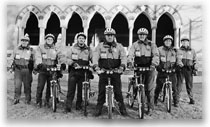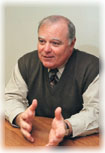![]()
Main Menu ·
Search ·
Current Issue · Contact · Archives · Centennial · Letters to the Editor · FAQs
![]()
Main Menu ·
Search ·
Current Issue · Contact · Archives · Centennial · Letters to the Editor · FAQs

 HUPD chief Francis D. "Bud" Riley (above) has deployed a phalanx of bike-riding police officers (right) as part of a new community-policing initiative.Photographs by Jon Chase
HUPD chief Francis D. "Bud" Riley (above) has deployed a phalanx of bike-riding police officers (right) as part of a new community-policing initiative.Photographs by Jon Chase |
Has the era when University police officers patrolled the Yard on foot gone the way of the Woodstock generation? Those patrolmen of the sixties were known to many Harvard students and employees by sight. Then the mid '70s saw campus police, ever mindful of the need for speedy call response, ensconced anonymously in sturdy patrol cars. The Harvard University Police Department (HUPD) of that time adopted a "law enforcement" or "professional" model of policing, focused on "making good busts." But following complaints in the early 1990s that some officers were racist, aloof, and overzealous, Harvard began taking steps to remodel the department as a community police force, making its officers a more visible, effective, and integral part of the University.
"Community policing" emphasizes familiarity with the community, and focuses on crime prevention more than law enforcement. Officers solve problems in teams, and undergo increased training at all levels of the department under a unified management philosophy. The phrase has been a refrain for Francis D. "Bud" Riley ever since he was named chief of HUPD in November 1995. When two students were arrested for distributing drugs in the spring of 1996, Riley noted that the College community had been a key part of the enforcement equation. Riley said at that time, "My intention is to make sure that we're close to the community when a problem like that develops....That's the proper function for a University police department."
Not all the officers on the University force saw their role that way, however. Riley told an interviewer from the Gazette, the University's official newsweekly, that some members of the force "express[ed] to me that 'We don't work for the University. We're sworn police officers. We have to enforce the law.'" Riley said he "felt that emphasis was misplaced, that the department had to focus on what the community needed. That's where our authority comes from, the community."
A recent study of the department conducted by community-policing expert George L. Kelling found that a rift had developed between the chief, who was hired to implement the community-policing model, and a number of high-ranking officers who still adhered to the "law enforcement" model of policing. Kelling concluded his study with a report recommending a restructuring of the department: elimination of mid-level managers, deployment of more officers on the street, and delegation of more authority to the teams of officers assigned to particular geographic areas, such as the Quad or the river Houses.
As a result of Kelling's report, seven lieutenant positions were eliminated early in May by vice president and general counsel Anne Taylor, who oversees the police department. Riley says all the affected officers received substantial severance packages and assistance in finding new work. Four new administrative positions were created, and additional patrol officers were hired as part of the reorganization.
In a sense, the department has come full circle from the '60s: there will indeed be more foot patrols. There will also be more officers on bicycles, a signature '90s contribution to policing. Riley is encouraging his officers to eat in House dining halls (at department expense) as a way to help them get to know the students. New recruits, who in the old days would have gone straight to the night shift ("the worst possible time to learn about the University," notes Riley), will now experience all shifts, "meeting people and getting to know Harvard."
Main Menu ·
Search · Current Issue · Contact · Archives · Centennial · Letters to the Editor · FAQs
![]()